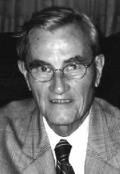Biographical Information

Edward Overton McCue III was born in 1923 to Isabel Chamberlain Cochran McCue and Edward Overton McCue Jr., he was a third generation graduate of University of Virginia Law School and a member of the Virginia State Bar. He practiced law in Charlottesville for thirty two years, retiring from active practice in 1995.
Too young for college when he graduated from Lane High School at fifteen, he was sent to Episcopal High School. He graduated with a host of friendships and highest honors in mathematics.
After service in World War II, Ed entered the University of Virginia, stayed one year then transferred to Yale University, graduating in 1950 with a degree in Civil Engineering. He earned his LLB from the University of Virginia in 1955.
He was fond of saying, "Next to my wife, the greatest love of my life is the United States Navy." He entered the V 12 program at University of Virginia in 1942, but the service and subsequent deaths of close relatives in World War II fueled his desire to be actively engaged in the war. He enlisted in 1942 and began active service in 1943. From 1944 until 1946 he was Senior Quartermaster of an LSM Command ship in the Asiatic Pacific Theater making combat landings in the Philippines and Borneo. His ship earned four engagement stars, one of which was for the operation that ousted the Japanese forces from Corrigidor Island. When he was released from active duty, he entered the United States Naval Reserve.
During the Korean Emergency, Ed was on the engineering staff of a Navy Seabee Battalion deployed to Argentia, Newfoundland and Port Lyuatey, French Morocco.
In 1967, he served as Action Officer and Acting Chief of the Special Activities Office in the intelligence division of the United States Military Assistance Command Viet Nam at its headquarters in Saigon: Assignment, the development and operational use of the sensor systems that came to be known as the "Electronic Battlefield." He received the United States Navy Commendation Medal for MACV service and, after 29 years in the Naval Reserve, retired in 1974 with the rank of Commander.
His years on Capital Hill covered the end of the Eisenhower administration, the Kennedy Administration and the beginning of the Johnson administration. From 1955 until 1956, he served as attorney-advisor in the Office of the General Counsel of the United States Department of Commerce in Washington, D.C. In 1959, he was appointed to the professional staff of the Joint Congressional Committee on Defense Production, a position he held until 1964. Concurrently, as an appointee of United States Senator Stuart Symington of Missouri, he served as Assistant Counsel to the United States Senate Armed Services sub-committee on the National Stockpile and Naval Petroleum Reserves.
Having grown up in a family with historical and political roots, Ed had an abiding interest in World War I notables Woodrow Wilson and Thomas Staples Martin, a United States Senator from Scottsville, Virginia. McCue was considered Albemarle County's foremost authority on Senator Martin and he bequeathed his treasure trove of information to the Scottsville Museum in 2004.
To the Charlottesville Historical Society of which he was a member and former president, he gave his valuable collection of materials on Captain John Jouett Jr., a Revolutionary War figure he held in high regard.
Politics captured his keen analytical mind during the last decades of his life. He meticulously researched Congressional records and read voraciously, acquiring a fine library on the politics and military involvements of the United States during both Bush administrations. He was an advocate and supporter of the Miller Center in Charlottesville, and his respect and affection for Kenneth Thompson, its long-time director, was boundless.
Ed served as a Trustee of the Jamestown-Yorktown Foundation from 1970 until 1984, and in 2001 he was made a member of the Jamestown-Yorktown Foundation Council. In that capacity, he was part of a feasibility study that ultimately guided the formation of the American Frontier Culture Museum. He was President of the Albemarle County Historical Society from 1976 until 1977 and a long time Director after that. A past president and Director of Albemarle Rotary Club, he remained a member until his death.
